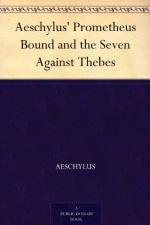
|
| Name: _________________________ | Period: ___________________ |
This test consists of 15 multiple choice questions and 5 short answer questions.
Multiple Choice Questions
1. Who vows to either kill Eteocles or drive him into exile?
(a) Parthenopaios.
(b) Polyneices.
(c) Kapaneus.
(d) Tydeus.
2. Who represents the way that Eteocles has followed his own will which he honors more than he honors the will of the gods?
(a) Amphiaraos.
(b) Polyneices.
(c) Parthenopaios.
(d) Kapaneus.
3. The principle contrast in Part 2 is between what two objects?
(a) Smell.
(b) Animals.
(c) Tastes.
(d) Noise.
4. Eteocles reaction was so extreme to whom because of his angry determination to save and protect the city?
(a) Polyneices.
(b) His army.
(c) The women.
(d) King of Argos.
5. Who is the fourth general the Scout describes as constantly shouting out his war cry and acting almost insane with blood lust?
(a) Melanippus.
(b) Megareus.
(c) Hippomedon.
(d) Parthenopaios.
6. The Chorus uses all of the following likening the destruction and violation of the city to the destruction and violation of a woman except:
(a) Spiritual.
(b) Intellectual.
(c) Moral.
(d) Physical.
7. The theme of the play is based on what two stories?
(a) Laius and Oedipus.
(b) Oedipus and Polyneices.
(c) Oedipus and Eteocles.
(d) Eteocles and Polyneices.
8. Who represents the voice of reason and faithfulness that Eteocles should have been listening to?
(a) Parthenopaios.
(b) Kapaneus.
(c) Eteoklos.
(d) Amphiaraos.
9. Who is nicknamed "Killer of many?"
(a) Eteoklos.
(b) Parthenopaios.
(c) Kapaneus.
(d) Polyphontes.
10. What is an ode?
(a) A poetic foil.
(b) A poetic metaphor.
(c) A poetic song.
(d) A poetic Euphony.
11. Who does Eteocles send to face the third general?
(a) Megareus.
(b) Dikes.
(c) Hippomedon.
(d) Hekate.
12. Who promises to "bring this man [Polyneices] to his harbor, and he shall enjoy his father's city?"
(a) Dike.
(b) Antigone.
(c) Ismene.
(d) Aktor.
13. Eteocles vows not to be afraid of Tydeus and does all of the following except:
(a) Charges Tydeus with bad judgement.
(b) Charges Tydeus with deafness.
(c) Ridicules the prophet.
(d) Charges Tydeus with blindness .
14. Eteocles' story and actions echo the story and actions of which other story?
(a) Polyneices.
(b) Laius.
(c) Oedipus.
(d) King of Argos.
15. Who says, "When they are brave, they are insolent and intolerable, and when they are frightened, they are rash and dangerous?"
(a) Eteocles.
(b) Polyneices.
(c) The Chorus.
(d) Eteocles' soldiers.
Short Answer Questions
1. Who is "unmoved by the sound of snorting horses?"
2. What is on Parthenopaios' shield?
3. Who does Eteocle appoint as the last and head general?
4. Who is the third general described as leading a cavalry of horses, which makes an arrogant, inhuman noise?
5. Eteocles' refusal to respect his agreement with Polyneices indicates his desire to ___________.
|
This section contains 404 words (approx. 2 pages at 300 words per page) |

|




